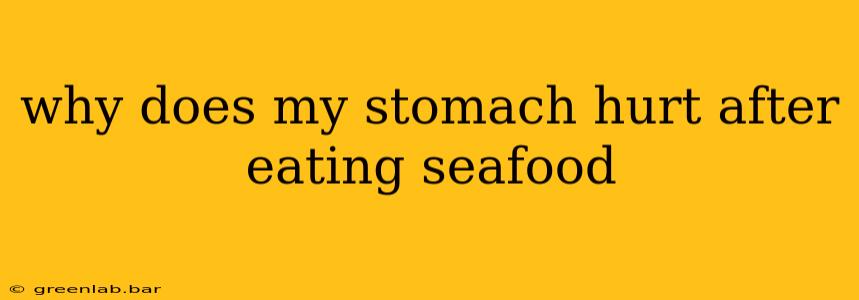Experiencing stomach pain after indulging in a delicious seafood meal can be frustrating and concerning. While a seafood feast is often a culinary delight, for some, it can lead to unpleasant digestive distress. Let's explore the potential culprits behind post-seafood stomach aches and what you can do to alleviate the discomfort.
Common Causes of Stomach Pain After Eating Seafood
Several factors can contribute to stomach pain after consuming seafood. These range from mild intolerances to more serious conditions.
1. Seafood Allergies and Intolerances
-
Histamine Intolerance: Seafood is relatively high in histamine, a compound released during the body's immune response. Individuals with histamine intolerance may struggle to break down histamine efficiently, leading to symptoms like stomach cramps, nausea, and diarrhea. This is not a true allergy but a sensitivity. The longer seafood is stored, the higher its histamine content.
-
True Allergies: Seafood allergies are a serious immune response, triggered by proteins found in shellfish (like shrimp, crab, and lobster) or finfish (like tuna, cod, and salmon). Symptoms can range from mild hives and itching to life-threatening anaphylaxis, including difficulty breathing and swelling of the throat. A true allergy requires immediate medical attention if severe symptoms occur.
2. Food Poisoning
-
Bacterial Contamination: Improper handling and storage of seafood can lead to bacterial contamination. Bacteria such as Vibrio, Salmonella, and Listeria can cause food poisoning, leading to symptoms such as nausea, vomiting, diarrhea, abdominal cramps, and fever. Consuming undercooked or improperly stored seafood is a primary risk factor.
-
Parasites: Certain types of seafood can harbor parasites. While many parasites are destroyed through proper cooking, consuming raw or undercooked seafood increases the risk of infection. Symptoms can vary but often include stomach cramps, diarrhea, and nausea.
3. Lactose Intolerance (If Consumed with Dairy)
If you consumed seafood accompanied by dairy products (like butter, cream sauces, or cheese), you might be experiencing symptoms related to lactose intolerance. Lactose intolerance doesn't stem directly from the seafood but rather from your body's inability to digest lactose, the sugar in milk. This can cause digestive upset similar to that experienced after eating seafood.
4. Gastritis or Other Pre-existing Conditions
Underlying conditions such as gastritis (inflammation of the stomach lining) or irritable bowel syndrome (IBS) can exacerbate digestive symptoms, making you more sensitive to certain foods, including seafood. If you frequently experience stomach pain after eating, regardless of the food type, consulting a doctor is crucial.
What to Do If You Experience Stomach Pain After Eating Seafood
-
Hydration: Drink plenty of fluids to prevent dehydration, especially if you're experiencing diarrhea or vomiting.
-
Rest: Give your digestive system time to recover.
-
Over-the-counter medication: For mild discomfort, over-the-counter pain relievers (like ibuprofen) or anti-diarrheal medications may provide relief. Always follow the dosage instructions.
-
Seek Medical Attention: If your symptoms are severe (such as severe abdominal pain, persistent vomiting, high fever, or difficulty breathing), seek immediate medical attention. This is particularly important if you suspect a severe allergic reaction or food poisoning.
Preventing Future Problems
-
Source your seafood carefully: Choose reputable seafood suppliers who prioritize food safety and proper storage.
-
Cook seafood thoroughly: Ensure seafood is cooked to the recommended internal temperature to kill harmful bacteria and parasites.
-
Identify potential allergens: If you suspect a seafood allergy or intolerance, consult an allergist or doctor for proper testing and guidance.
-
Pay attention to your body: If you frequently experience stomach pain after eating seafood, keep a food diary to identify potential triggers.
This information is for general knowledge and does not constitute medical advice. Always consult a healthcare professional for diagnosis and treatment of any medical condition.

